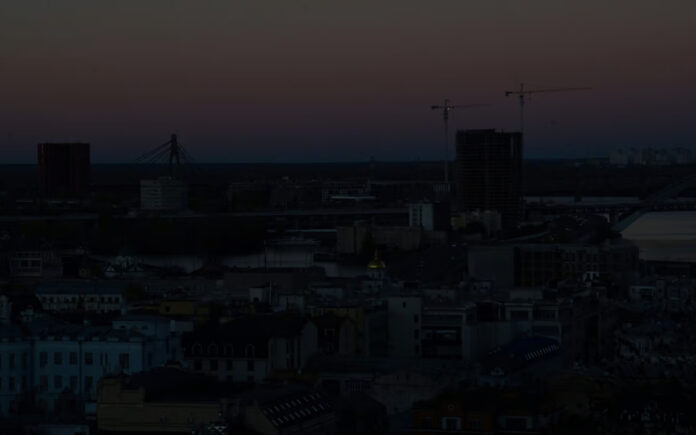Kyiv: Ukraine is grappling with severe power outages following relentless Russian attacks that have incapacitated half of the country’s power generation capacity. In Kyiv, entire districts are disconnected from the power grid during the day to conserve energy. The city is filled with the sounds of generators outside cafes and shops, while traffic lights remain off, causing heavy congestion.
Residents and businesses in Kyiv are adapting to life without consistent electricity by using generators, power banks, and flashlights, even planning bathroom visits around the blackout schedules. The extensive damage to Ukraine’s power infrastructure has left millions uncertain about meeting the national electricity demand, especially as colder weather approaches.
“I light my apartment as our grandparents used to — with candles and small flashlights,” said Rudoy, a 40-year-old insurance agent from Israel. He relocated from Tel Aviv to Kyiv in 2023 after Russia’s full-scale invasion of Ukraine on February 24, 2022.
Rudoy, seeking a new life despite the ongoing war, bought an apartment in a newly built 25-story high-rise entirely dependent on electricity, with no gas system or water supply. “I have to adjust my life to the blackout schedules, otherwise, it is impossible to live normally — not even to use a toilet at times,” Rudoy told The Associated Press.
He often works at a friend’s place in a nearby district or at a cafe with a generator, though the noise and diesel fumes can be disruptive. “Even if you find a free table at a cafe nearby, working generators are very noisy and spread diesel fumes,” he said. “That’s why not many cafes that operate during blackouts are actually good to work in.”
Since March, systematic Russian attacks on Ukraine’s power infrastructure have intensified, forcing utilities to ration household electricity. Ukraine’s top officials have repeatedly called for more air defense systems to protect power plants from Russian missiles and drones. Despite this, significant damage has already been inflicted.
The current blackouts in Kyiv are the worst since the early months of the war when Russian strikes led to major winter-time outages. These outages forced authorities to establish communal heating areas and emergency points for residents to recharge their phones, drink tea, and seek help.
“As of today, due to missile and drone attacks, we have lost 9.2 gigawatts of electricity (generating capabilities),” Ukrainian Prime Minister Denys Shmyhal said in early June. Despite the capacity to import 2.2 gigawatts from European countries, Ukraine is currently importing 1.7 gigawatts, Shmyhal noted.
Ukraine is also working to attract foreign investment to its private energy sector. At a summit in Berlin this month, Ukraine presented investment projects that could enable an additional capacity of 1 gigawatt, according to Volodymyr Kudrytskyi, head of the power utility Ukrenergo.
However, the short-term outlook for Ukraine’s readiness before the next winter remains highly uncertain. The damage to the energy system, the potential for reconstruction, and the rising electricity demand create a precarious situation.
Also Read | South Korea Protests Moscow’s New Defense Pact with Pyongyang Amid Heightened Border Strife
Official power outage schedules from Ukrainian energy operators help residents plan their day, but unscheduled emergency blackouts often occur when the city overconsumes electricity during peak hours. These circumstances force businesses and households to rely on alternative power sources.
Oleksandr Solovei, the 25-year-old owner of Informatyka coffee shop in Kyiv, is planning to buy a generator to keep his business open during blackouts. “We prepare hot water in advance to cook matcha and teas. Cooking coffee at times like this is impossible. The coffee machine consumes too much energy,” Solovei told the AP.
Also Read | India Responds to Canadian Parliament’s ‘Moment of Silence’ for Nijjar, Khalistan ‘Citizen Court’
A fiber-optic internet cable and a power bank that keeps the router on attract patrons to Informatyka, where they can work on their laptops. Despite this, customer numbers have dwindled since the blackouts began.
“We think the situation will get worse (by winter),” Solovei said. “We already plan to buy a generator, powerful enough to brew coffee, light the space, and charge the devices of our visitors. We are preparing for a hard winter.”



